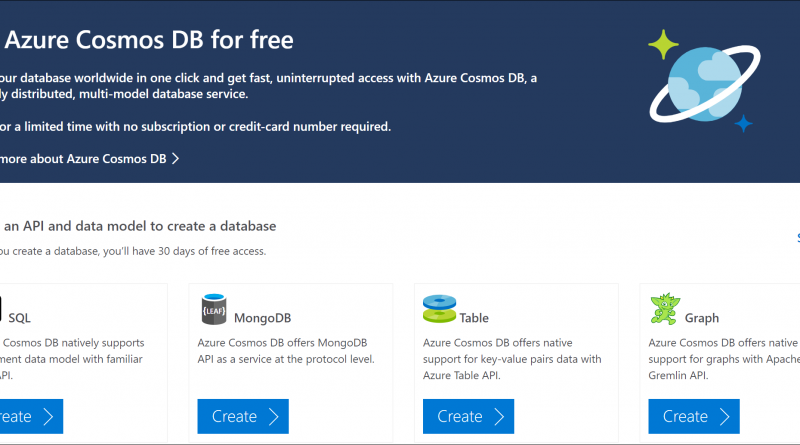Azure Cosmos DB Developer Experience updates
The Azure Cosmos DB team is excited to announce new features and improvements for developers:
- 1-month free trial of Azure Cosmos DB
- SDK updates to support multi-region writes
- Cosmos Explorer
- Portal UX updates and recommendations
- Emulator support for all APIs & Azure DevOps build task
1-month free trial of Azure Cosmos DB
You can now try Azure Cosmos DB for free for an entire month! This trial allows you to evaluate Azure Cosmos DB’s capabilities for free for 30 days, including creating a database with up to 25 containers (collections) and up to 10,000 Request Units (RU)/second of throughput, no Azure subscription or credit required. Get started with Try Azure Cosmos DB. Azure Cosmos DB is also included in the Azure free account, which includes 400 RU/s for 12 months.
.NET, Java, JavaScript, and Python SDK updates
The JavaScript 2.0 SDK is now generally available. We’ve added support for multi-region writes, a new “fluent” style object model – making it easier to reference Cosmos DB resources without an explicit URL– and support for promises and other modern JavaScript features. It is also written in TypeScript and supports the latest TypeScript 3.0.
With these changes, you can create a new database, container, and add an item in 10 lines of code!
In the new Python 3.0 SDK, in addition to multi-region write support, we’ve changed the namespace to azure.cosmos, and renamed ‘document_client’ to ‘cosmos_client.’ Because Azure Cosmos DB supports multiple API models, we’ve also renamed the concepts of “collection” and “document” to “container” and “item.”
| SDK | Latest Release |
| .NET | 2.1 |
| Java | 2.2 |
| JavaScript | 2.0 |
| Python | 3.0 |
Cosmos Explorer
Cosmos Explorer provides a full-screen standalone web-based version of the popular Azure Cosmos DB Data Explorer. With Cosmos Explorer, you can access your database accounts and containers, run queries, and view results, all with the full-screen real estate. You can also share temporary access to authorized peers, without the need for them to have subscription or Portal access.
Cosmos Explorer also supports showing query execution metrics, under the Query Stats tab. You can also download a CSV to view detailed metrics at the partition level. Learn more about these metrics and how to tune your queries in Azure Cosmos DB.
To try Cosmos Explorer, navigate to Data Explorer, and click the Open Full Screen link. You can also go directly to https://cosmos.azure.com/ and paste in a connection string. Learn how to use Azure Cosmos DB explorer to manage your data.
New UX for creating accounts in the Portal
We’ve updated the Azure Cosmos DB account creation experience in the Portal. Now, you can take advantage of the full screen when creating new Azure Cosmos DB accounts.
You can also track the status of your account creation.
Recommendations
The Azure Cosmos DB Portal can now show you alerts, recommendations, and messages for your account. To see them, navigate to the Overview tab and view the Notifications section.
For example, the recommendation below suggests that many values of the partition key property in a collection are null and should be reviewed to ensure a good distribution.
Azure Cosmos DB Emulator updates
The Azure Cosmos DB Emulator provides a local environment that emulates the Azure Cosmos DB service for development purposes. The emulator allows you to develop and test your application locally, without creating an Azure subscription or incurring any costs.
With the latest release, you can now use the emulator with any API supported by Cosmos DB, which includes SQL, Mongo DB, Cassandra, Gremlin, and Table API.
In addition, if you’ve ever tried to set up the Azure Cosmos DB emulator to run as part of your build and release process, you know it can be hard to maintain. Now, you can use the new Azure Cosmos DB Emulator build task extension for Azure DevOps (formerly Visual Studio Team Services). With the build task, you can run tests directly against the emulator, all as part of your CI pipeline!
To get started, follow the tutorial and install the extension from the Marketplace.
Stay up-to-date on the latest Azure #CosmosDB news and features by following us on Twitter @AzureCosmosDB. We are really excited to see what you will build with Azure Cosmos DB!
Source: Azure Blog Feed









